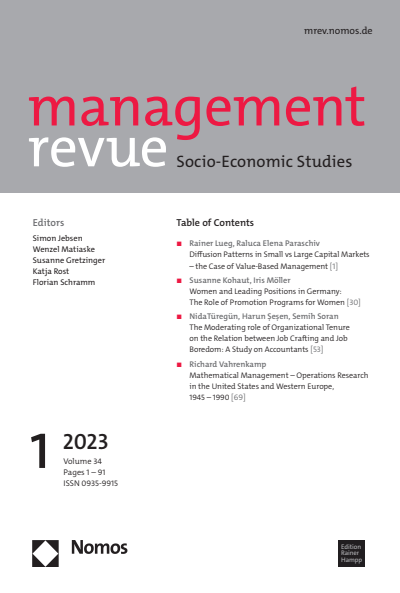为多代劳动力做准备:我们需要知道的
IF 1.7
0 MANAGEMENT
引用次数: 2
摘要
劳动力人口结构已经发生了变化,企业领导者开始质疑如何处理来自不同年龄段的员工。随着明显的代沟,代际冲突问题日益突出。员工之间的代际分歧并不新鲜,因为每一代人都受到不同的历史、社会经济和政治事件的影响,每一代人都带来了自己独特的观点。大多数组织的领导者都意识到了这一点,尽管很少有人愿意解决这种冲突。即使他们这样做了,也会产生不确定性。这些差异,或者说他们独特的代际特征,是由于他们早年所经历的历史事件。由于大多数文学起源于西方,发生的历史事件不同,它们的特征可能在地理上有所不同。对代际动态的深入和实际的理解可以提高管理在处理当今多代劳动力方面的有效性。因此,本研究旨在深入了解马来西亚婴儿潮一代、X一代和Y一代在当地工作的特点,并将其与西方进行比较。本文章由计算机程序翻译,如有差异,请以英文原文为准。
Bracing for the Multi-Generational Workforce: What We Need to Know
Workforce demographics have changed, and business leaders have started to question how to handle employees from different generations. With the noticeable generational divide, the issue of generational conflict is gaining prominence. Generational disagreement among employees is not new as each generation is shaped by different historical, socio-economic, and political events where each generation brings with them their unique perspective. Leaders in most organizations are aware of it, albeit few are willing to address such conflicts. Even if they do, uncertainties arise. These differences, or their unique generational characteristics, are due to the exposure to historical events during their early years. As most literature stems from the West and the historical events that happened are different, their characteristics may differ in terms of geography. An in-depth and practical understanding of generational dynamics could enhance the effectiveness of management in handling today’s multi-generational workforce. Hence, this research aims to provide insights into the characteristics of Malaysian Baby Boomers, Generation X, and Generation Y who are working locally and comparing them with the West.
求助全文
通过发布文献求助,成功后即可免费获取论文全文。
去求助
来源期刊

Management Revue
MANAGEMENT-
CiteScore
1.20
自引率
0.00%
发文量
7
期刊介绍:
Management Revue - Socio-Economic Studies is an interdisciplinary European journal that undergoes peer review. It publishes qualitative and quantitative work, along with purely theoretical papers, contributing to the study of management, organization, and industrial relations. The journal welcomes contributions from various disciplines, including business and public administration, organizational behavior, economics, sociology, and psychology. Regular features include reviews of books relevant to management and organization studies.
Special issues provide a unique perspective on specific research fields. Organized by selected guest editors, each special issue includes at least two overview articles from leaders in the field, along with at least three new empirical papers and up to ten book reviews related to the topic.
The journal aims to offer in-depth insights into selected research topics, presenting potentially controversial perspectives, new theoretical insights, valuable empirical analysis, and brief reviews of key publications. Its objective is to establish Management Revue - Socio-Economic Studies as a top-quality symposium journal for the international academic community.
 求助内容:
求助内容: 应助结果提醒方式:
应助结果提醒方式:


